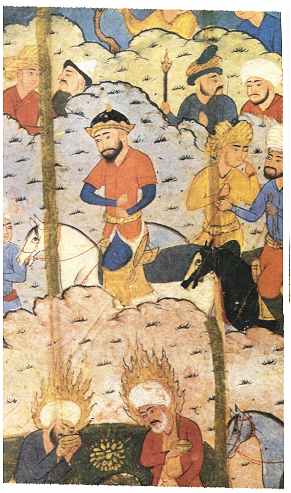
He was one of the rarest Knowers of God, a Pillar in the Sunnah of the Prophet and a unique saint. He was an imam (religious leader), an `alim (religious scholar), and an `arif (spiritual knower of God). He was the master of his time in raising the stations of his followers. Scholars and pious people used to flood in huge numbers into his khaniqah (retreat) in the city of Merv, in present-day Turkmenistan, to listen to him.
Born in Buzanjird near Hamadan in 440 H., he moved from Hamadan to Baghdad when he was eighteen years of age. He studied the Shafi’i school of fiqh under the supervision of the master of his time, Shaykh Ibrahim ibn `Ali ibn Yusuf al-Fairuzabadi. He kept association in Baghdad with the great scholar, Abu Ishaq ash-Shirazi, who gave him greater deference than to any of his other students although he was the youngest.
He was so brilliant a jurisprudent that he became the marja` (reference) of his time for all scholars in that field. He was known in Baghdad, the center of Islamic knowledge, in Isfahan, Bukhara, Samarqand, Khwarazm, and throughout Central Asia.
Later in his life he secluded himself and left the world behind. He became an ascetic and engaged in constant worship and mujahada (spiritual struggle). He associated with Shaykh Abdullah Ghuwayni and Shaykh Hasan Simnani, but his secret was given him by Shaykh Abu `Ali al-Farmadhi. He made progress in self-denial and contemplation until he became the Ghawth (Arch-Intercessor) of his time. He was known as the Rain of Realities and Truth and Spiritual Knowledge. He finally settled in Merv. Through him countless miraculous events occurred.
From His Miracles
He reflected the Divine attribute of Severity (al-Qahhar) with those who opposed the dissemination of spirituality. Following are two of his miraculous deeds in that respect:
One day he was holding an association in which he was enlightening the listeners with heavenly knowledge. Two literalist scholars who were present said, “Keep quiet, because you are devising innovation.” He said to them, “Do not talk about matters that you do not understand. It is better for you to die than to remain.” As he spoke these words they immediately fell dead.
Ibn Hajar al-Haythami records in his book Al-Fatawa al-Hadithiyya:
Abu Sa`id Abdullah ibn Abi `Asran, the Imam of the School of Shafi’i, said, ‘When I began a search for religious knowledge I accompanied my friend, Ibn as-Saqa, who was a student in the Nizamiya School, and it was our custom to visit the pious. We heard that there was in Baghdad a man named Yusuf al-Hamadani who was known as al-Ghawth, and that he was able to appear whenever he liked and was able to disappear whenever he liked. So I decided to visit him along with Ibn as-Saqa and Shaykh Abdul Qadir al-Jilani, who was a young man at that time. Ibn as-Saqa said, ‘When we visit Shaykh Yusuf al-Hamadani I am going to ask him a question the answer to which he will not know.’ I said, ‘I am also going to ask him a question and I want to see what he is going to say.’ Shaykh ‘Abdul Qadir al-Jilani said, ‘O Allah, protect me from asking a saint like Yusuf Hamadani a question, but I will go into his presence asking for his baraka blessings and Divine Knowledge.’
‘We entered his association. He veiled himself from us and we didn’t see him until after one hour had passed. He looked at Ibn as-Saqa angrily and said, without having been informed of his name, ‘O Ibn as-Saqa, how dare you ask me a question when your intention is to confound me?’ Your question is this and your answer is this!’ Then he said to Ibn Saqa, ‘I am seeing the fire of kufr (unbelief) burning in your heart.’ He looked at me and said, ‘O `Abdallah, are you asking me a question and awaiting my answer? Your question is this and your answer is this. Let the people be sad for you because they are losing as a result of your disrespect for me.’ Then he looked at Shaykh ‘Abdul Qadir al-Jilani and said to him, ‘Approach, my son. I am going to bless you. O `Abdul Qadir, you have satisfied Allah and His Prophet with your proper respect for me. I see you in the future sitting on the highest place in Baghdad and speaking and guiding people and saying to them that your feet are on the neck of every wali (saint). And I am seeing every wali of your time bowing to you because of your great station and honor.’”
Ibn Hajar al-Haythami continues, “`Abdul Qadir has been lifted up and all that shaykh al-Hamadani said about him came to pass. There came a time when he did say, ‘My feet are on the necks of all the awliya (saints),’ and he was a reference and a beacon guiding all people in his time to their destinations.”
“The fate of Ibn as-Saqa was something else. He was brilliant in his knowledge of the Law of Islam. He preceded all the scholars in his time. He used to debate with the scholars of his time and overcome them, until the khalif called him to be a member of his court. One day the khalif sent him as a messenger to the King of Byzantium, who in his turn called all the priests and scholars of Christianity to debate him. Ibn as-Saqa was able to defeat all of them in debate. They were helpless to give answers in his presence. He gave them answers that made them look like mere students in his presence.
“His brilliance fascinated the King of Byzantium so that he invited him to his private family gathering. There Ibn as-Saqa’s eyes fell on the daughter of the King. He immediately fell in love with her, and asked her father, the King, for her hand in marriage. She refused except on condition that he accept her religion. He did, leaving Islam and accepting the Christian religion of the princess. After his marriage he became seriously ill. They threw him out of the palace. He became a town beggar, asking everyone for food, yet no one would provide for him. Darkness had come over his face.
“One day he saw someone that had known him before. That person relates: ‘I asked him, ‘What happened to you?’ He replied, ‘There was a temptation that I fell into.’ The man asked him, ‘Do you remember anything from the Holy Qur’an?’ He replied, ‘I only remember rubbama yawaddu-l-ladheena kafaru law kanu muslimeen (‘Again and again will those who disbelieve wish that they were Muslims’ [15:2]).
“‘He was trembling as if he was giving up his last breath. I turned him towards the Ka’aba (the West), but he kept turning towards the East. Then I turned him back towards Ka’aba, but he turned himself to the East. I turned him a third time, but he turned himself to the East. Then as his soul was passing from him, he said, ‘O Allah that is the result of my disrespect to Your Arch-intercessor Yusuf al-Hamadani.’”
Imam Haythami continues: “Ibn `Asran said, ‘I went to Damascus and the king there, Nuridin ash-Shaheed, put me in charge of the department of religious affairs, and I accepted. As a result, the worldly life came at me from every side: provision, sustenance, fame, money, position for the rest of my life. That is what the Arch-intercessor Yusuf al-Hamadani had predicted for me.’”
Yusuf al-Hamadani’s ق words illustrate his high station among the saints. He said:
The opening of the faculty of spiritual hearing in the friends of God is like a message from Reality, a chapter in the Book of God, a blessing from the knowledge of the unseen. It is the beginning of the opening of the heart and its unveiling—good tidings from the heavenly stations! It is the dawn of understanding of Divine meanings. This hearing is sustenance for the spirit and life for the heart. It is the subsistence of the secret. God makes Himself Witness for the visions of His chosen servants, and adorns them with His blessed acts and decorates them with his Attributes.
Of his saints, he makes one group hear through His Exalted Witnessing. He makes others hear through His Unique Oneness. He makes another group of them hear through His Mercy. And He makes some hear through His Power.
Let it be known to you, O human being, that God has created, from the Light of His manifestations, 70,000 angels and assigned them to various stations between the Throne and the Chair. In the Presence of Intimacy, their dress is green wool, their faces are like the full moon, they stand in His Presence in awe, fainting, drunk with His Love, running endlessly from the Throne to the Chair and back because of the emotion and the mercy which is burning in their hearts. Those are the Sufis of the heavens and Israfil ع (the angel who will blow the Trumpet on the Judgment Day) is their leader and their guide, and Gabriel u is their president and their speaker, and al-Haqq (God, the Truth) is their King. God’s blessings are upon them.
This is how Mawlana Yusuf al-Hamadani ق, the shadow of God on earth, described the heavenly reality and exalted stations of the Sufis. May God bless his soul and sanctify him. He died in Khurasan, between Herat and Bakshur, on the 12th of Rabi al-Awwal, 535 AH/1140 CE and was buried in Merv. Near his tomb a large mosque and a large school were built. He passed his secret to Abul Abbas ع who in turn passed it on to Grandshaykh Abd al-Khaliq al-Ghujdawani ق, who received it directly from Yusuf al-Hamadani ق as well.
